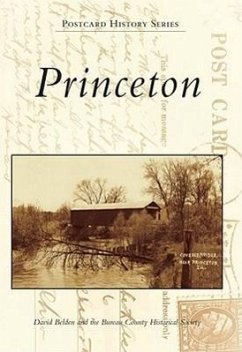In 1831, the settlement of Princeton, Illinois, began as families from New England, and later the Mid-Atlantic states, traveled West seeking good land. These early settlers built the Hampshire Colony Congregational Church. Rev. Owen Lovejoy, one of its earliest pastors, became a well-known abolitionist and used his Princeton home to harbor runaway slaves. Before the Civil War, Princeton citizens convinced Burlington Railroad to lay rails within a mile of their town. The community expanded its main street to meet the railroad and insure the town's growth. Today Princeton remains a richly endowed and vital community, set in the peaceful countryside of North Central Illinois.
Bitte wählen Sie Ihr Anliegen aus.
Rechnungen
Retourenschein anfordern
Bestellstatus
Storno


